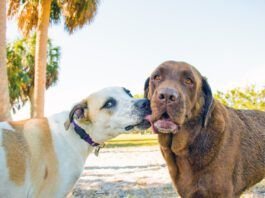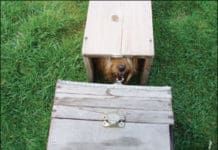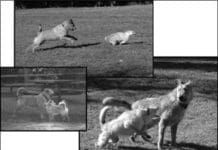Conditioning Confidence in Your Dog or Puppy
There was once a time when you rarely encountered the word socialization" in dog circles. Today it's the new training buzzword; if you haven't heard it at least three dozen times by the time your dog is a dozen weeks old
Fear-Free Dog Training Methods
or threatening his general well-being if he made the wrong move. It wasn't fear of punishment or fear of me or some sort of amorphous "respect" that he had for me
Installing Safe and Affordable Fencing for Dogs
There was a time when no one thought twice about letting their dogs roam the neighborhood. A fenced yard was almost unheard of. If you grew up in the 1950s and '60s as I did, you may remember those times. Dogs were well socialized, loved kids, and it was no big deal when the neighbor's dog came over and visited your female dog in season. Of course, they also chased cars, got pregnant a lot, and occasionally although rarely bit someone. You may also remember, as I do, a long list of childhood pets who got shot, hit by cars, or simply vanished, having fallen victim to who knows what fate. Today, our canine companions are more likely to be spayed or neutered, vaccinated, and responsibly contained. As a result, they tend to live safer, longer lives. But having a fence isn't always the be-all, end-all solution that it seems to be. Fences can bring on a host of challenges that our parents never faced with the family dog a generation ago.
Earthdog, An Underground Dog Training Activity
As long as there have been farmers and hunters, there have been “earth dogs.” Hardy, scrappy little dogs helped hunters tree squirrels, run rabbits to ground, corner foxes in their dens, and clear vermin from dwellings. As often happens, humans found a way to create competitive games from dogs’ natural abilities. For terriers and Dachshunds, a sport is born. Earthdog! Get that rat! As early as 211 B.C., mention was made of tiny rough-coated dogs used to follow animals into their burrows. Later, in the 1576 book De Canibus Anglicis, by Johannes Caius, the use of terriers was described in detail. In 1935, after many years of friends gathering together to test their dogs’ capabilities against those of their friends’ dogs, the Dachshund Club started offering trials modeled after German training for fox and badger hunting. This included building underground tunnels up to 50 feet long, with twists and turns along the way that required dogs to make decisions about which way to go to find their quarry. And it’s dark down there! In 1941 the Sealyham Terrier Club issued the first “working certificate,” which outlined requirements for dogs to search out woodchucks. In 1971 the American Working Terrier Association (AWTA) started artificial den trials in the U.S. By 1994, the American Kennel Club had launched its Earthdog program.
Understanding Your Dog’s Body Language
Otto has gotten short shrift lately, poor guy. My husband and I had the brilliant idea of undertaking a minor home remodeling project over the holidays – just the bathroom! As is often the case with all-consuming home improvement projects, the dog was left to his own devices more than he should have been for a number of weeks. Months ago, that would have been a recipe for disaster; Otto would have excavated half the yard and chewed up everything he could have gotten his mouth on. But he must be growing up; even after a few weeks of minor neglect, the only thing he chewed up was one of my husband’s high-top leather work boots. Amazing, considering the number of tools and wood and paintbrushes left lying around. He amused himself largely with a new obsession: running along our back fence with our neighbor’s two-year-old German Shepherd Dog, Schotzie. Our lot is about 80 feet wide, and both dogs share a mostly unimpeded path along that entire boundary, with just an ivy-covered five-foot-high chain-link fence between them. They are both young, active, and bored (the neighbors have a new baby). So, up and down they go, thundering through the mud, whining with frustration and excitement. It could be worse; they could be fence-fighting and barking (and maybe, if we remodeled the entire house, it would advance to this). But they seem to enjoy each other. And at least they are both getting exercise!
Solutions for Reactive Dog Behavior
At some point in our lives, some of us find ourselves living with a difficult dog, one whose behavior challenges our patience, and exhausts our training knowledge – and opens our hearts and eyes to a new, better way of training. This is the story of one such dog and her very knowledgeable dog owner. Together, they reached an entirely new and higher level of dog training skills, thanks to the owner’s life-altering experiences with a reactive dog who wasn’t fit to compete in the career intended for her: Flyball. Flyball is not the sport for everyone. It is a relay team event, which means you have to commit to training and competing with your dog and other dogs and dog owners as a team, and you have to have an appreciation for over-the-top dogs and the resulting cacophony of sounds. In flyball, a team of four dogs race, one after the other, leaping a series of hurdles, throwing their bodies against a spring-loaded box that ejects a tennis ball, snatching the ball, and hurtling their bodies back down the row of jumps to where their next teammates strain to be released for their turns. The fastest team wins.
Nocturnal Dogs
and matching leash all get softer with time and laundering. I like the extra large D-ring for snapping the leash onto.
Help for OCD Dogs
that he fails to drink! Then
Getting to Know Your Dog
It's going to be really difficult to stay caught up with everything we've been going through with our new dog, Otto. Every day brings...
Tug O’ War is a Fun Game to Play With Your Dog
Contrary to conventional wisdom in some dog training circles, tug is a great game to play with most dogs - as long as you and your canine pal play by the rules. Lots of my clients have dogs with aggressive, reactive, and other stress-related behaviors. One of the best ways to help reduce stress is to increase exercise. Tug is great exercise. I'm constantly encouraging my clients to play tug with their dogs. Inevitably when I suggest it I get a puzzled look and a tentative protest that "some trainer" told them playing tug would make their dog dominant and aggressive. I sure wish I could meet that pervasive "some trainer" some day and convince him/her otherwise. It just isn't so. Tug has a lot going for it besides just being good exercise. Most dogs love to tug. Of course, the caveat is that you play tug properly - with rules, which I'll discuss in a minute. Here are some of the many other reasons this game ranks high on my list of approved activities.
Solutions for a Dog Who Digs the Yard
The perfect storm, canine edition: Combine one dog who is accustomed to and prefers spending time outdoors; a spate of hot, dry weather; a lush, productive garden full of herbs and tomato plants growing in raised boxes full of expensive, loamy soil and moistened three times daily by an automatic drip system. What do you get? Holes dug in the garden and an irate husband! Our new dog, Otto, nearly made himself quite unwelcome on his second day in our home. Every time I turned around, I'd find him digging in any place we'd recently watered, including the lawn, a flowerbed in front of the house, underneath a gorgeous hydrangea bush that's already hard-pressed to survive our hot summers, and, most seriously, the vegetable beds in back. Can't you train this dog not to dig?" my husband implored. But this wasn't a training issue; I've been trained enough by Pat Miller and our other contributing trainer/writers to recognize a management situation when I see it!"
Socializing a Shy Dog
Somewhere at this very moment, perhaps at a shelter near you, a frightened dog huddles in the back of her kennel, trembling, terrified by a chaotic overload of sensory stimuli: sights, smells, and sounds that are far beyond her ability to cope. Somewhere, today, a warmhearted, caring person is going to feel sorry for this dog - or one similar - believing that love will be enough to rehabilitate the frightened canine. Sometimes, it is. More often, though, the compassionate adopter finds herself with a much larger project than she bargained for. While shelters can a prime source for frightened and shy dogs, they are certainly not the only source. Pet stores, puppy mills, rescue groups, and irresponsible breeders (even some who breed top quality show dogs) can all be guilty of foisting off temperamentally unsound (due to genetics/nature) or under-socialized (due to environment/nurture) puppies and adult dogs on unprepared adopters.


















